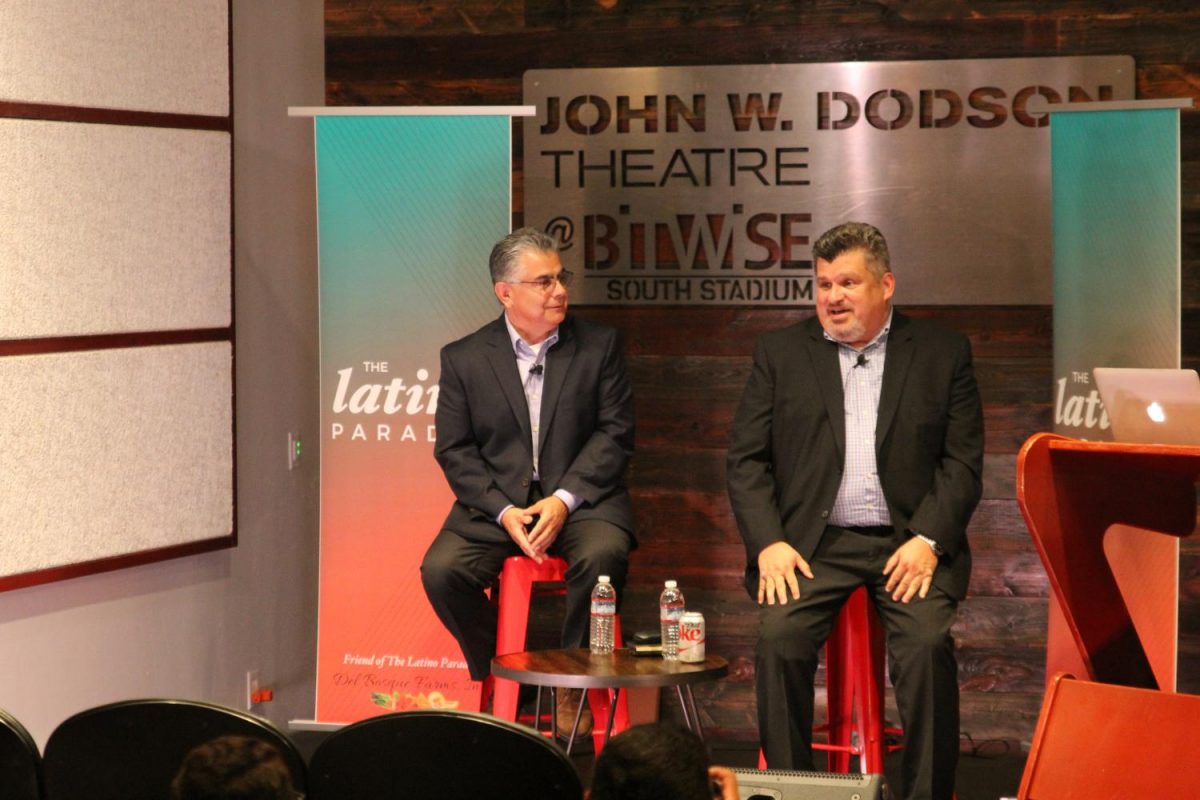Immigration Conversation Takes Center Stage at BitWise Industries
Photo by: Marco Rosas
Arnold Torres and Ruben Navarrette at BitWise Industries during the Latino Paradox Forum on Thursday, Sept. 14, 2017.
September 27, 2017
BitWise Industries in Downtown Fresno has hosted many diverse events in the past, but their most unique in recent time is the live podcast forum on Sept. 14.
The Latino Paradox is a podcast starring nationally syndicated columnist and Fresno native, Ruben Navarrette and policy analyst and strategist, Arnold Torres.
Torres and Navarrette brought their podcast to Fresno to discuss many issues relating to immigration and how recent events like the end of DACA not only relate to the Latino community, but also Fresno specifically.
Navarrette grew up in Sanger while Torres is from Sacramento.
The two have a friendship that spans three decades, during which they’ve had many conversations on hot button topics like immigration.
“We used to have these conversations on the phone,” Navarrette said. “We got to talking about how we should record this…so we took to Skype and we did a webcast and called it The Latino Paradox.”
“Latino Paradox refers to the fact that there are 54 million Latinos in the country,” Navarrette said. “They have a lot of buying power but no political power.”
Navarrette and Torres have several videos on YouTube and The Latino Paradox Facebook page each spanning about 10 minutes or so. Wednesday was the first time the two had ever done a live filming of their podcast.
The event itself was put together by Martin Chavez and funded by farmer Joe Del Bosque who was honored before the forum and presented with the Xenia Recognition by Rene Moncada, the former president of Arte Americas.
Del Bosque is a Firebaugh farmer who has played a significant role in the agricultural community. He even garnered the attention of former President Barack Obama through his speeches about issues in the agricultural community.
“The Xenia Recognition is taken from the ancient Greek concept,” Moncada said, “the generosity and courtesy to those who are far from home.”
Following Del Bosque’s speech, Torres and Navarrette began the forum with Chavez acting as a moderator between the two.
“For 30 years Arnold and I have talked about immigration in New York, Washington and Miami,” Navarrette said. “Those people don’t understand immigration… you have to come to places like Fresno to understand immigration.”
The first question the two tackled was the Raise Act and whether or not it served as adequate immigration reform.
The Raise Act would allow employers to check the legal status of potential workers through the government as well as cut the limit of visas to 500,00 and create a merit based system of immigration setting a preference for educated and skilled immigrants over all others.
“It’s a phenomenal departure on what this country was built on,” Torres said.
Torres stated that he believes the U.S. was built on the principle of nonexclusive immigration and that a merit based system would rob other countries of valuable resources.
Navarrette also opposed the merit based system stating that a developed country like the U.S. does not need more educated and skilled workers but rather people to do manual labor that Americans refuse to do.
Next, the two tackled the issue of whether migrant field workers were necessary in our advancing technology. The two quickly shot the question down citing several crops that would be ruined if picked by machines.
“There are some interesting innovations, but if you go out and pick strawberries by machines, before you know it you end up with jam,” Navarrette said.
“How do we get Latinos to support Latinos?” Ricardo Franco, a candidate for the 22nd Congressional District, asked.
“What sense of urgency are we giving our own community about the importance of voting?” Torres asked. “The million dollar issue is we’re always looking to the young; are they going to be the future or are they going to be the demise of our population?”
Navarrette told Franco that Bill Clinton, George W. Bush and Barack Obama all ran for congress and lost the first time.
Franco later said it is ironic that “as Latinos become a larger part of the population in California and other states, our voter participation continues to lag.”
The podcast wrapped up but the discussions that were started that night continue.
The Latino Paradox Podcast Forum is available on the podcast’s Facebook page in its entirety.
“I was proud,” Franco said, “to be around people who shared that opinion at the forum.”

